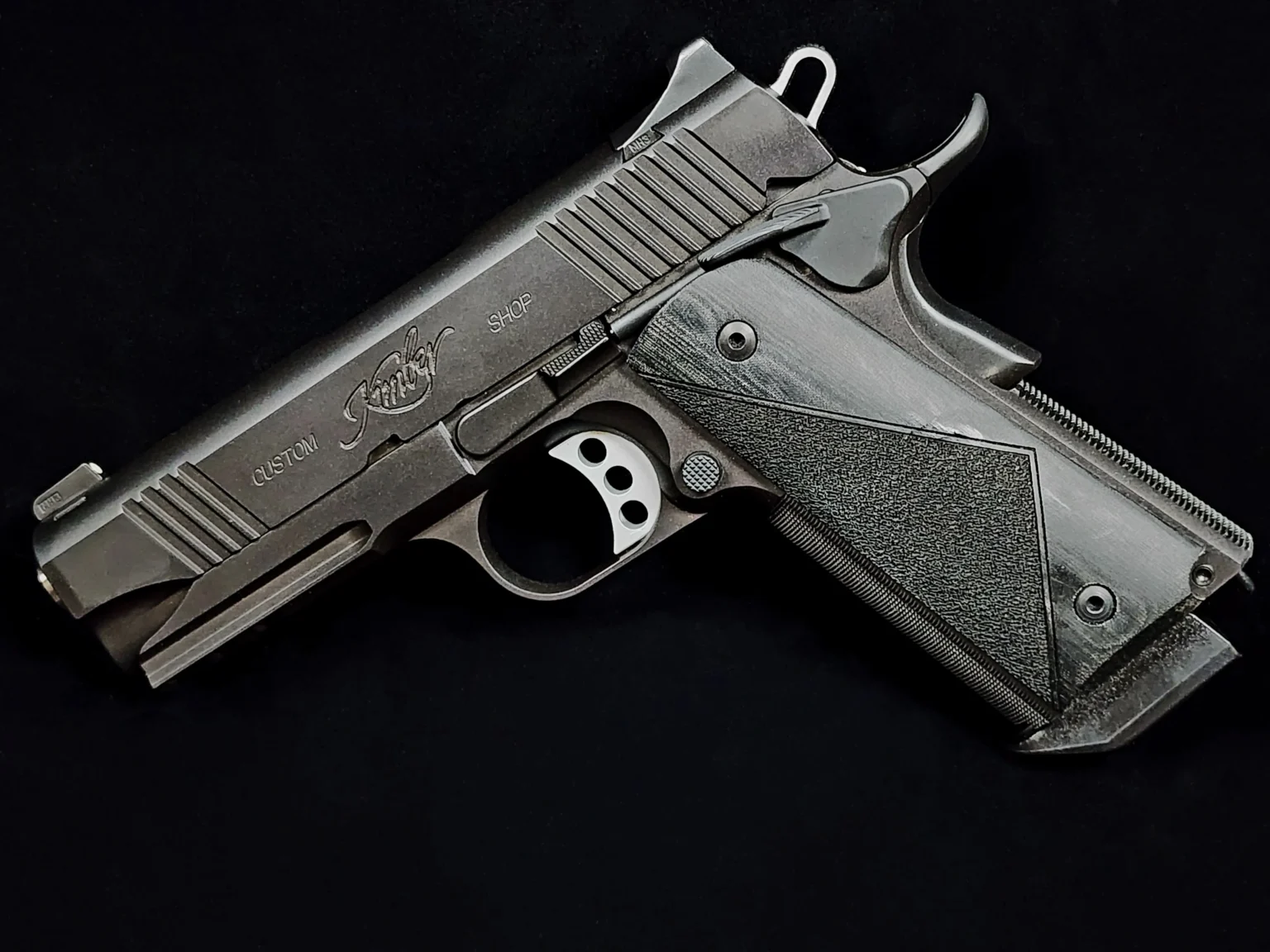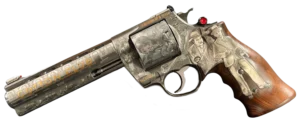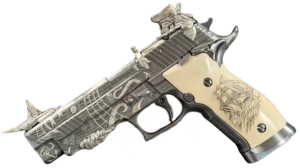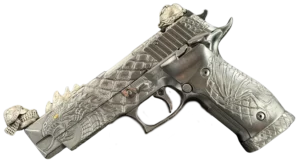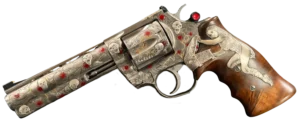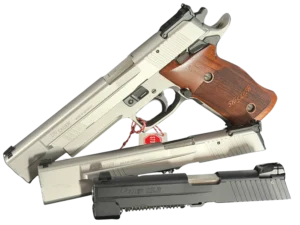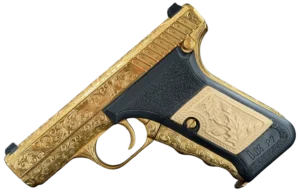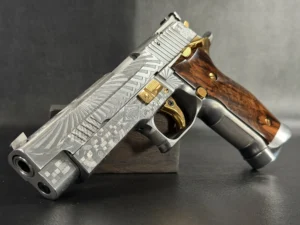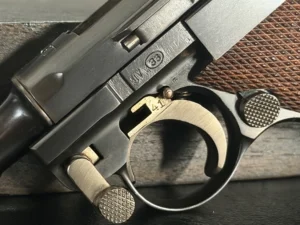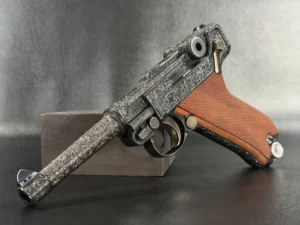Key Takeaways:
- Kimber 1911s aren’t just well-built — they’re personal: From hand-fitted parts to thoughtful design choices, these pistols feel like someone actually cared when they made them. You can tell the difference the moment you rack the slide or squeeze the trigger. It’s craftsmanship you can feel.
- There’s a Kimber for everyone — whether you’re a range junkie, a history nerd, or just love pretty guns: With over 40 models (some sleek, some wild, some made to be shown off), Kimber’s lineup isn’t one-size-fits-all. Whether you’re carrying it daily or locking it in a velvet-lined display case, there’s probably one calling your name.
- Treat it right, and a Kimber 1911 will outlast you: These pistols are built to run — but they’re also built to be taken care of. Regular cleaning, smart storage, and the occasional checkup go a long way. Do that, and your grandkids might end up fighting over it someday.
Let’s get one thing out of the way — if you’re here, reading this, chances are you already have a soft spot for 1911s. And if not? Well, you’re about to understand why so many folks swear by them, especially when the name “Kimber” is stamped on the slide.
This isn’t just a rundown of features or a bullet-point checklist. It’s more like sitting down with someone who’s spent some real time with these pistols — someone who’s cleaned one too many carbon-caked slides at 2 a.m., cursed a stubborn recoil spring, and still grins every time they feel that crisp break of a match-grade trigger.
We’re diving into where Kimber came from, what makes their 1911s different, which models turn heads (and why), and yeah — even the nitty-gritty of keeping them running clean.
So pour a drink, settle in, and let’s talk steel and soul.
Where It All Started: Kimber’s Backstory
Kimber didn’t just pop up out of nowhere, fully formed with polished blued slides and hand-checkered grips. Like most good things, it started small. Back in 1979, Jack Warne and his son Greg set up shop in Clackamas, Oregon. They weren’t looking to crank out mass-market firearms. This was a family operation focused on quality — full stop.
And that focus? It stuck.
Word started spreading. Shooters noticed the difference. Kimber guns weren’t just accurate — they felt good in your hand. Balanced. Thoughtful. There was a level of care baked into every single one that you couldn’t fake.
Eventually, the company shifted its headquarters east — New York, to be exact — and started pushing out its own line of 1911s. That’s when things really took off. They weren’t just building guns anymore. They were building a reputation.
And yeah, these days they’re a household name — if your household includes gun oil and range bags, anyway.
A Sea of Steel: The Kimber 1911 Lineup
Let’s be honest: 1911s are everywhere. Everyone and their cousin make one now. But Kimber? Kimber throws down over 40 different versions of the platform, and somehow they all manage to bring something a little different to the table.
You’re not just picking a gun — you’re picking a vibe.
Kimber Custom
This is the one that probably put Kimber on your radar. The Custom series is the flagship. Full-size frame, 5-inch barrel, and that classic 1911 silhouette that just feels… right.
They offer it in everything from .45 ACP to 9mm and even 10mm if you like your range days with a little extra boom. But the real standout isn’t just the caliber options — it’s the details. Match-grade barrel. Extended beavertail grip safety. Trigger so clean it feels like it’s reading your mind.
It’s not flashy. It’s just really, really good.
Kimber Rare Firearms
Now this-this is where things start to get fancy.
Rare Firearms are Kimber’s collector-grade, limited-edition beauties. And when I say limited, I mean blink-and-they ‘re-gone. We’re talking polished blue finishes, custom engravings, grip panels that look like they belong in a museum.
Take the Royal II, for example. Classic lines, deep engravings, and that unmistakable sheen. Or the Sapphire Ultra II — a compact 1911 dressed in brilliant sapphire blue that looks almost too pretty to shoot.
Almost.
These aren’t just “showcase” guns, though. They’re fully functional, range-ready, and deadly accurate. They just happen to be stunning while doing it.
Kimber Collector Firearms
Sort of like the Rare line’s practical cousin, the Collector series still brings limited-edition swagger — but with an eye toward everyday carry or shooting.
One of the most talked-about is the Texas Edition. Engraved with the Lone Star and draped in pride, it’s as much a tribute piece as it is a fully capable sidearm. These models mix form and function in a way that hits collectors right in the feels.
And yeah — they shoot as good as they look.
What Really Sets Kimber Apart?
Plenty of companies can stamp “1911” on a frame and call it a day. But Kimber? Kimber actually cares about the experience, not just what the gun does on paper, but how it feels to use. Here’s why they stand out.
1. Craftsmanship You Can See (and Feel)
It’s not marketing fluff. Every Kimber 1911 is hand-fitted by actual humans. You can tell. No rattle, no slop, no “eh, good enough.” Every part — from the match-grade barrel to the tuned trigger — is fitted like it matters because it does.
It’s kind of like wearing a tailored suit after living in off-the-rack clothes your whole life. You might not know exactly why it’s better — you just feel it is.
2. Classic Design, Modern Touch
Let’s face it — the 1911 is a century-old design. That’s a good thing. But Kimber doesn’t let tradition hold them back from smart upgrades.
They stay true to the silhouette, the controls, the spirit. But they also add things like forward slide serrations, tactical rail options, improved sights, and ergonomic grips. The soul of the 1911 is intact — it just got a tune-up for 21st-century hands.
3. Accuracy You Can Bet Your Life On
This one matters. Because a pretty gun is nice. But if it doesn’t shoot straight? What’s the point?
Thanks to that match-grade barrel, the clean trigger pull, and the overall precision build, Kimber 1911s are flat-out accurate. Whether you’re plinking at cans or squaring off in a competition, these guns hit where you tell them to. And they do it again. And again.
4. Reliability That’s Actually Real
It doesn’t matter how pretty or accurate a pistol is if it chokes every third mag.
Thankfully, Kimber pistols are built to run. They feed just about anything you put in them, and they don’t mind getting dirty. That’s not marketing hype — that’s from hundreds of shooters who’ve dragged them through matches, training classes, and daily carry.
Keeping Your Kimber Happy: Maintenance That Matters
Now, a well-made gun like the Kimber 1911 deserves a little TLC. Doesn’t have to be a chore — just part of the ritual. Here’s how to keep yours humming.
Clean It Like You Mean It
After each session, give it a proper clean. Carbon, unburned powder, all that gunk — it adds up. Get in there with a real cleaning kit, take your time, and don’t rush the process. You’ll learn your gun better that way, too.
Lube It Right
Don’t go overboard — you’re not marinating a steak. But do make sure the rails, barrel lugs, and moving parts are lightly lubed. Kimber pistols run tight, and a little slickness keeps everything smooth.
Store It Safe
Seriously — invest in a decent safe or lockbox. Not just for theft prevention (though that matters), but also to protect against humidity, bumps, and the occasional nosy guest.
And let’s be real — you’re not tossing a $50 garage-sale .22 on a shelf. Kimber 1911s are heirloom-level pieces. Treat ’em that way.
Check It Every Now and Then
Even great guns wear out over time. Springs lose tension. Extractors get tired. Maybe your mags are starting to misfeed — little signs. Don’t wait for a malfunction to find out. Take a look now and then. Replace what’s worn. It’s worth it.
So, Where Do You Actually Buy One?
Good news: Kimber 1911s aren’t rare unicorns. You can find them through quality gun shops, both in-store and online. But — and this matters — buy from someone reputable.
Plenty of fly-by-night operations out there selling “great deals” that end in customer service nightmares. If you’re going to drop serious coin on a premium pistol, make sure the place has a name people trust.
Better yet, you can browse straight from Kimber’s own site. You’ll see their full lineup, current inventory, and even get options for custom work. No guesswork. No fakes. Just the real deal, direct from the folks who make ’em.
Final Thoughts: Why the Kimber 1911 Still Matters
At the end of the day — sorry, scratch that — when it really comes down to it, the Kimber 1911 is about more than specs and stats. It’s about a feeling.
It’s about picking up a pistol that just feels right, about knowing that someone built this thing with pride and attention and intention. That you’re not holding a product — you’re holding a craft.
Whether you’re a seasoned collector, a first-time 1911 buyer, or just someone who appreciates good steel and great engineering, a Kimber 1911 isn’t just another gun on the rack.
It’s a statement.
So yeah — take your time, read the forums, hit the range. But when you’re ready to pull the trigger (literally and metaphorically), don’t be surprised if you find yourself going home with a Kimber.
And once you do? You’ll get it.
Frequently Asked Questions
Short answer? Yeah — if you care about how a gun feels, shoots, and holds up over time. You’re not just paying for a name. You’re paying for hand-fit parts, match-grade barrels, and the kind of craftsmanship that makes you look at your pistol a little longer before putting it back in the safe. It’s an investment, sure — but it makes sense.
That’s a good question — people often mix these up. Rare models are the showstoppers: limited runs, custom finishes, deep engravings —the kind of thing that makes collectors drool. Collector models still look amazing, but they’re made to be carried and shot. Think of it like this: Rare models are tuxedo night. Collector models are characterized by a leather jacket and boots — cool yet practical.
It can be, depending on which model you pick. Kimber produces compact versions, such as the Ultra Carry and Micro 9, that are easier to conceal without sacrificing quality. Just keep in mind, 1911s are all-metal, so they’re a little heavier than your average polymer carry gun. Some folks love that extra heft — it adds stability and soaks up recoil. Others… not so much.
Look — no gun is perfect 100% of the time. But Kimber 1911s are seriously reliable. Feed them decent ammo, keep them clean(ish), and they’ll run like champs. These guns aren’t built to be babied. They’re built to shoot — and shoot well.
If you’re expecting Glock-level simplicity, you might need to adjust your expectations. A Kimber 1911 is a bit like owning a classic car — regular cleaning, good lube, and a little mechanical awareness go a long way. But no, it’s not high-maintenance in the diva sense. It’s just… precise. Treat it right and it’ll return the favor.


